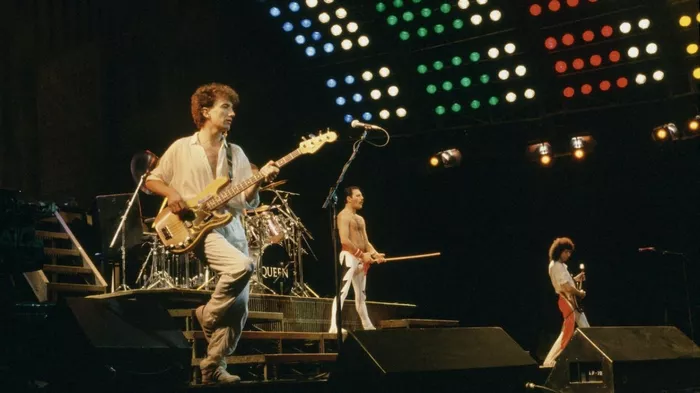Rock music, often referred to simply as “rock,” is a genre that has captured the hearts and souls of music enthusiasts for decades. Its influence extends far beyond the realm of music, shaping entire subcultures and lifestyles. In this article, we will delve into the vibrant and dynamic world of rock music culture. Each paragraph will prominently feature the keyword “rock music” as we unravel the history, evolution, and impact of this genre on society.
The Birth of Rock Music: A Revolution Begins
Rock music, born in the mid-20th century, is a genre characterized by its powerful rhythms and electrifying melodies. It emerged in the United States as a fusion of various musical styles, including blues, country, and rhythm and blues. The term “rock and roll” was coined to describe this new sound, and it quickly became a sensation. Rock music, in its early days, was a vehicle for rebellion and self-expression, a way for artists to challenge societal norms.
One of the pioneers of rock music, Elvis Presley, brought the genre to the forefront of popular culture in the 1950s. His energetic performances and distinct vocal style made him an icon of rock music. Presley’s impact on the genre cannot be overstated, as he laid the foundation for generations of rock musicians to come.
The Evolution of Rock Music: A Sonic Odyssey
Rock music didn’t stop with Elvis Presley; it continued to evolve and diversify. In the 1960s, the British Invasion brought bands like The Beatles and The Rolling Stones to the forefront, introducing a new sound that combined rock with elements of pop and rhythm and blues. The psychedelic rock movement emerged, characterized by its experimental and mind-altering soundscapes.
As rock music continued to evolve, subgenres such as punk rock, glam rock, and progressive rock emerged. Each subgenre brought its unique flavor to the genre, pushing the boundaries of what rock music could be. Punk rock, for example, was known for its raw energy and rebellious spirit, while progressive rock pushed the boundaries of musical complexity and storytelling.
The Global Impact of Rock Music: A Unifying Force
Rock music transcends geographical boundaries and languages, making it a universal form of expression. It has been a driving force in numerous cultural revolutions and political movements. For instance, during the 1960s and 1970s, rock music played a significant role in advocating for peace and civil rights. Iconic songs like John Lennon’s “Imagine” and Bob Dylan’s “The Times They Are A-Changin'” became anthems for social change.
Furthermore, rock music has the power to unite people from diverse backgrounds. Rock festivals, such as Woodstock, have brought together hundreds of thousands of music lovers to celebrate the genre. These gatherings showcase the unifying power of rock music, where people of all walks of life can come together to share their passion.
The Icons of Rock Music: Legends and Innovators
No discussion of rock music would be complete without paying tribute to the countless artists who have left an indelible mark on the genre. Icons like Jimi Hendrix, Led Zeppelin, and Queen have shaped the landscape of rock music with their innovative compositions and legendary performances. Hendrix’s virtuosic guitar skills pushed the boundaries of what was possible with the instrument, while Led Zeppelin’s groundbreaking sound fused blues, rock, and folk into an electrifying blend.
Queen, led by the incomparable Freddie Mercury, is known for their theatrical and operatic approach to rock music. Songs like “Bohemian Rhapsody” and “We Will Rock You” have become timeless classics that continue to captivate audiences to this day.
The Resurgence of Rock Music: Modern Innovations
While rock music has a rich history, it continues to evolve in the modern era. Contemporary rock bands and artists, such as Foo Fighters, Arctic Monkeys, and Florence + The Machine, have brought fresh perspectives and sounds to the genre. These musicians embrace both the roots of rock music and contemporary influences, creating a dynamic and ever-changing landscape.
The digital age has also had a profound impact on how rock music is created and consumed. With the advent of streaming platforms and social media, artists have more opportunities than ever to connect directly with their fanbase. This has allowed for greater experimentation and collaboration within the genre.
Rock Music in Popular Culture: Beyond the Sound
Rock music’s influence extends well beyond the realm of music itself. It has made a significant mark on fashion, art, and even film. The rebellious spirit of rock has inspired countless fashion trends, from leather jackets and band t-shirts to eccentric stage costumes. Iconic album covers, such as Pink Floyd’s “Dark Side of the Moon,” have become art pieces in their own right.
In the world of film, rock music has provided unforgettable soundtracks that enhance storytelling. Martin Scorsese’s use of rock music in “Goodfellas” and Quentin Tarantino’s inclusion of rock tracks in films like “Pulp Fiction” have elevated scenes and left lasting impressions on audiences.
Conclusion
Rock music’s enduring legacy is a testament to its cultural significance. It has stood the test of time, evolving and adapting while maintaining its core essence. The genre continues to inspire new generations of musicians and fans alike, ensuring its place in history as one of the most influential and enduring forms of artistic expression.
In conclusion, rock music is not just a genre; it’s a cultural phenomenon that has shaped the world in profound ways. From its rebellious roots to its diverse subgenres and global impact, rock music has left an indelible mark on society. It has brought people together, challenged the status quo, and provided a soundtrack to countless lives. As long as there are electric guitars and passionate souls, rock music will continue to evolve and resonate with generations to come.

